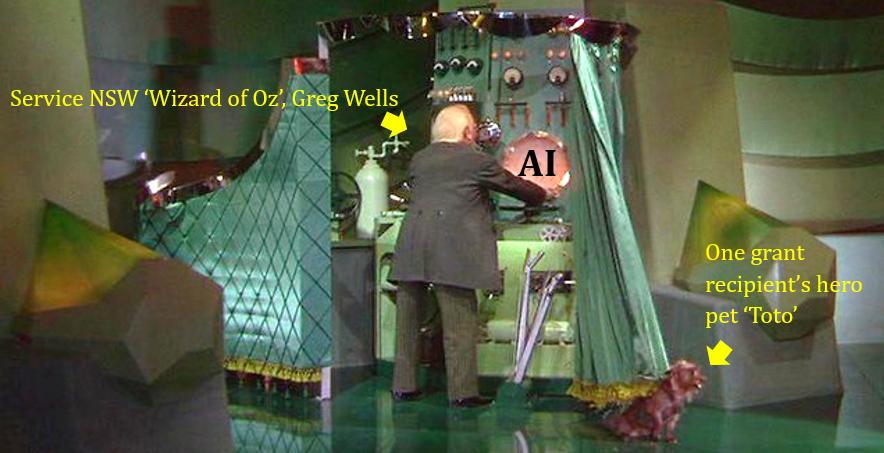Service NSW ‘Wizard of Oz’ exposed from behind his AI curtain of clawback extortion

Yes as we suspected, Service NSW has employed ‘AI‘ (Artificial Intelligence) and automated processes to assist in reviewing applications for various grants, including the ‘2021 COVID-19 Micro Business Grant‘ (this Grant) retrospectively 3 years after it had already long approved, assessed and paid out 63,000 of them.
Dorothy to Toto: “We’re Not in Kansas anymore”
Feedback we’ve received from a number of grant recipients is that Service NSW retrospective ring-debt collectors have confirmed that its so-called ‘Compliance Review‘ then if that didnt work in AI, some dodgy ‘Internal Review‘ of long approved grant recipients.
Seems Service NSW CEO Greg Wells has become a devotee signatory to ‘AI Boom’ – that is computer programming coded data matching, away from individual cased-based human scrutiny. Even if it is outsourced shit cheap tech to process your batch of presumed 63000 default fraudsters by shit coders!
She’ll be right, Wellsie! See you at I.C.A.C.!
Neither are within the scope of this Grant’s Terms and Conditions, both by their terms and in legal audit timeframe, so both reviews are invalid.
It’s just a fabricated convenient and lazy bureaucratic time and money saving tactic by Service NSW to use some outsourced taxpayer-funded averaging computer tool to blanketly label hundreds, if not thousands, of originally approved grant recipients retrospectively as being fraudster so the grant can be falsified as a debt and despatched to sister agency Revenue NSW for hardcore debt collection.
This is NSW Government extortion abusing AI
The Service NSW spin doctors claim that this computer programming “technology helps it streamline the application process, improve efficiency, and ensure accurate assessments“.
What they forget to mention is that this original (real) application process concluded back in 2021. Instead, the current process is nothing but extortionate grant clawback by a desperate new government.
The Service NSW spin doctors go on: “However, human oversight is still integral to the final decision making.” Human oversight by ring-in contracted debt collectors paid on a commission basis!
The PR goes on…
“Service NSW does utilize AI for data matching to enhance the accuracy and efficiency of their processes, particularly in areas like fraud detection and application verification. While specific software tools and audit companies they partner with may not be publicly disclosed, they often work with various data analytics and management platforms.
For debt collection, Service NSW may engage third-party agencies (aka Revenue NSW), but the specific names of these agencies are typically not public listed (except on this website :)”
Revenue NSW using AI to claw back overpaid and fraudulent COVID-19 business grants
[SOURCE: by Aimee Chanthadavong, 23 Nov 2021, ZDNET, https://www.zdnet.com/article/revenue-nsw-using-ai-to-claw-back-overpaid-and-fraudulent-covid-19-business-grants/]
‘Revenue NSW has turned to using AI and data analytics to help it work through compliance efforts to assess whether people were overpaid or if there were fraud cases as a result of recent COVID-19 businesses grants that were provided by the state government.
“[We’re] using a rule-based system (aka computer data one-size-fits-all matching programming) where we can enhance irregular patterns in the data that we’re seeing and quickly move them through a modelling process into investigation for fraud and compliance,” Scott Johnston, Revenue NSW deputy secretary and State Revenue chief commissioner, told the audience at the 2021 digital NSW event.
“A quarter of a million businesses received grants through this process. We can’t look at all of them. There’s extreme urgency to ensure that people got the money that they needed to but also to do it in the right way, and a lot of responsibility over the next six months and 12 or more will fall on us to effectively drive this this effort.”
NSW government’s debt collection agency broke law using AI garnishee orders
by Paul Thorndike May 21, 2024
Ombudsman report finds Revenue NSW engaged in ‘maladministration’ by taking money directly out of millions of bank accounts.
The New South Wales government’s debt collection agency broke the law when it used an automated system to withdraw money from millions of bank accounts to claw back unpaid fines, a scathing report has found.
The NSW ombudsman Paul Miller’s report, released on Tuesday, found Revenue NSW’s use of AI to generate garnishee orders broke the law from its introduction in 2016 until 2019, and that it was “wrong” until March 2022.
A garnishee order is when Revenue NSW takes money directly out of people’s bank accounts if they have defaulted on their ‘debt’ repayments and have not responded to repeated debt recovery notices.
Revenue NSW does not have to go to court to issue a garnishee order. Since 2016, the agency has used machine learning technology (AI) to assist it to generate high volumes of garnishee orders each day.
The ombudsman started investigating the scheme in 2016 after its introduction prompted a large number of complaints. An earlier report, released in 2021, found Revenue NSW had unlawfully used the system to recover fines from financially vulnerable people, in some cases draining bank accounts and leaving people unable to buy food.
While in opposition, NSW Labor had labelled the scheme ‘Robodebt 2.0‘. The then-Coalition government rejected those comparisons.
In its report released on Tuesday, the ombudsman found Revenue NSW engaged in “maladministration”.
Revenue NSW has obtained advice from the solicitor general confirming the version of the system that has been in place since May 2022 is lawful. But the ombudsman found the agency broke the law with the garnishee order system it had in place from January 2016 to March 2019.
Despite undergoing some changes, the scheme was “wrong” between March 2019 to March 2022 because it did not provide decision-makers with clear reasoning and evidence, or clearly and fully record those decisions. Among the ombudsman’s recommendations is for Revenue NSW to provide better information to people who owe debts, including publishing on its website how they may be challenged.
Revenue NSW should also include instructions in its garnishee orders reminding banks not to recover any Centrelink “saved amounts” and introduce safeguards to ensure “protected amounts” are left in people’s banks accounts after garnishee action.
The agency has applied a “protected amounts” policy since March 2019, meaning the minimum amount it must leave in someone’s bank account after garnishee action. The current minimum protected amount is $587.50.
The Minns NSW Minister for Finance (which controls debt collector Revenue NSW), Courtney Houssos MLC, said the NSW Government was committed to implementing the ombudsman’s recommendations in full and had “already begun that work”.
[COMMENT: Famous last words. Courtney Houssos qualification is a degree in Arts. “Courtney Houssos is the NSW Minister for Finance and NSW Minister for Natural Resources, so delegated by Premier Minns to two ministerial portfolios. Houssos studied at the University of New South Wales, where she was awarded a Bachelor of Arts (Politics and International Relations, Industrial Relations” SOURCE. Housson holds no qualifications in either finance or natural resources]
References:
[1] ‘Revenue NSW using AI to claw back overpaid and fraudulent COVID-19 business grants’, by Aimee Chanthadavong, Contributor Nov. 23, 2021,
https://www.zdnet.com/article/revenue-nsw-using-ai-to-claw-back-overpaid-and-fraudulent-covid-19-business-grants/
[2] ‘NSW government’s debt collection agency broke law using AI garnishee orders‘, by Paul Thorndike May 21, 2024, https://nswcreditlaw.com.au/2024/05/21/nsw-governments-debt-collection-agency-broke-law-using-ai-garnishee-orders/, Credit – The source of this article is www.theguardian.com, 30 April 2024;
[3] Loyal Toto…
[4] ‘What is corrupt conduct?‘, “Corrupt conduct by a public official involves a breach of public trust”, https://www.icac.nsw.gov.au/about-corruption/what-is-corrupt-conduct
We reproduce that definition from that website link above, because we cannot trust government to preserve that definition. Currently that definition reads (before the incumbent government deletes it for its convenience) …
So what is the definition of corrupt conduct, for the instructive wisdom of the NSW I.C.A.C.?
From the 101 manual…
“Corrupt conduct, as defined in the Independent Commission Against Corruption Act 1988 (“the ICAC Act”), is deliberate or intentional wrongdoing, not negligence or a mistake. It has to involve or affect a NSW public official or public sector organisation.
While it can take many forms, corrupt conduct occurs when:
- a public official improperly uses, or tries to improperly use, the knowledge, power or resources of their position for personal gain or the advantage of others
- a public official dishonestly exercises his or her official functions, or improperly exercises his or her official functions in a partial manner, breaches public trust or misuses information or material acquired during the course of his or her official functions
- a member of the public influences, or tries to influence, a public official to use his or her position in a way that affects the probity of the public official’s exercise of functions
- a member of the public engages in conduct that could involve one of the matters set out in section 8(2A) of the ICAC Act where such conduct impairs, or could impair, public confidence in public administration.
The NSW community expects public officials to perform their duties with honesty and in the best interests of the public. Corrupt conduct by a public official involves a breach of public trust that can lead to inequity, wasted resources or public money and reputational damage.
Some examples of corrupt conduct are:
- a local councillor voting in favour of a development in which the councillor has an undisclosed financial interest
- a member of the public bribing an official to pass a driver’s licence test
- a former public official selling confidential information gained while working in an official capacity.
For the ICAC to be able to pursue a matter (that is, for the matter to be within ICAC jurisdiction), the corruption must involve or affect a NSW public official or public authority.
If the ICAC is to consider investigating the matter, the conduct must also meet the conditions set out in section 9 of the ICAC Act. These conditions are that the conduct could constitute or involve:
- a criminal offence, or
- a disciplinary offence, or
- constitute reasonable grounds for dismissing or otherwise terminating the services of a public official, or
- in the case of a member of the NSW Parliament or local government councillor, a substantial breach of an applicable code of conduct.
Types of public sector conduct other than those defined in the ICAC Act, such as instances of poor administration or a personal grievance, are best referred to another agency such as the NSW Ombudsman or the Anti-Discrimination Board. A matter is also outside the ICAC’s jurisdiction if it relates to complaints against private sector organisations, non-public officials or Federal Government bodies in a way which has no connection to the NSW public sector.
The full definition of corruption which applies to the ICAC is detailed in sections 7, 8 and 9 of the ICAC Act.


We wish the NSW I.C.A.C. speedy investigative success and transparent public justice in all its lawful endeavours.



